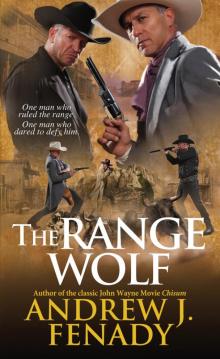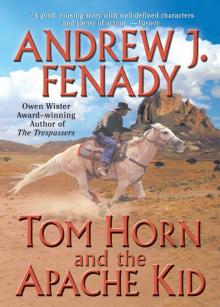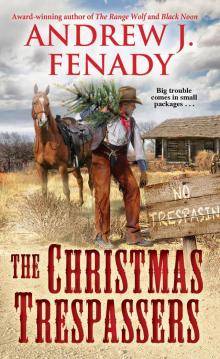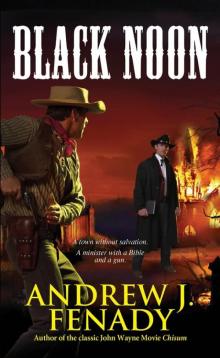- Home
- Andrew J. Fenady
The Range Wolf Page 13
The Range Wolf Read online
Page 13
Crazy or not, I had found myself, while listening to Wolf Riker, completely fascinated, and even carried away from the situation we now faced. I wanted to hear more about the ranch, the two brothers’ struggle for its success . . . and why they became such bitter enemies. Even now I thought about how he was suffering in the wagon and did not want me, or anyone else, ever to witness him in such a weakened and vulnerable state.
But my thoughts were interrupted once again. This time by the sight of Dr. Picard sitting and leaning against a rock near his and Flaxen’s wagon, while smoking a curved ivory pipe.
“Seems like everyone’s up late tonight, doctor.”
“When I drank I didn’t smoke, but now . . . well, everyone has to have some vice.”
“And some have more than one,” I smiled.
“You’ve been visiting our leader again, have you, Mr. Guthrie?”
“Doctor, were you ever with him when he has those . . . headaches?”
“Yes. But he won’t let me stay, or try to help him.”
“I think he goes nearly blind. Do you know what causes them?”
“I’d like to think it’s some sort of divine retribution. Of course that’s not a medical opinion.”
Picard took a moment to relight his pipe.
“Mr. Guthrie, I’ve heard different versions—also that an operation might cure the condition. But, of course, he refuses to discuss the situation. However, there are other issues to contemplate.”
“Such as?”
“Such as . . . we have the better part of a thousand miles to go on treacherous terrain with dwindling supplies, the makings of a mutinous crew, Indians on the horizon, a maniac in command, who has a brother who might do anything to stop him and us. Just to mention a few.”
“That’s quite enough, thank you.”
“You’re welcome. Pleasant dreams, Mr. Guthrie.”
CHAPTER XXXIII
Of all that had happened the day and night before—Wolf Riker’s confrontation with Smoke over Bucephalus—his verbal blistering of Latimer and Leach—driving the drovers at a headlong pace—supper with Flaxen and telling her of Horace Greeley—bidding her good night—overhearing half a dozen drovers conspiring to pull out, or worse—Riker winning my money from a drunken Cookie—listening to Riker’s tale of winning another card game with an assist from Pepper—the three of them, Wolf, Dirk, and Pepper, disposing of three interlopers—the birth of the Double R brand and ranch—Riker struck by another seizure—Alan Reese’s refusal to join the other conspirators—and Dr. Miles Picard’s appraisal of our prospects and odds of ever finishing the drive to Kansas—the last thing that came to my mind before falling asleep was a kiss from Flaxen Brewster.
For a good part of the next day the drive moved at what now was our customary pace.
Ridges. Rincones. Barrancas. Cathedral mountains in the distance. Dry. Desolate. Land that had been conquered time and again.
Yet remained unconquered.
Tobacco and I were riding near point not far from Wolf Riker, astride Bucephalus.
Chandler and Smoke, who had been scouting ahead, came riding back as if their hair was on fire. They reined in close to Riker and pointed back to the direction they had come from. I rode up within hearing distance. So did half a dozen of the drovers.
“Eagle Pass ahead,” Chandler said swallowing his breath. “Can’t go around. Got to go through . . .”
“So?” Riker said.
“Indians.”
“How many?”
“Maybe a dozen at the pass. Maybe more elsewhere.”
“Comanch’, I think,” Smoke added.
“Armed?”
“Most of ’em,” Chandler nodded. “Seems like they want to talk . . . for starters.”
“Then we’ll talk . . . for starters. Guth, go back. Bring up a bunch with guns. Leave enough to guard the herd. Smoke, you talk Comanch’?”
“Some.”
“Stay close to me. Well, Guth, get moving.”
I did.
Within minutes word had spread along the drive.
I rode up to the wagon with Dr. Picard at the reins and Flaxen next to him.
“Indians,” I said. “Flaxen, you get inside and stay there.”
“No, I . . .”
“Don’t argue. It’s best they don’t see you.”
“He’s right,” Picard nodded.
Pepper pulled his wagon alongside.
“Guthrie.” He reached down under the seat, brought up a gun belt and holstered revolver, and held it out toward me. “Strap this on. At least you’ll look dangerous.”
I complied, then started to ride and catch up with Riker and the others.
Pepper produced a rifle and followed in his wagon.
At Eagle Pass there was a line of about a dozen mounted red men and a line of more than a dozen drovers with Riker in front, along with Chandler and Smoke next to him.
Riker moved his horse ahead a short distance and motioned to the Indian who carried the coup stick of a chief. A coup stick that was at least as old as the chief.
Without saying a word Wolf Riker took a cigar out of his shirt pocket, struck a match, lit the cigar, and inhaled. He motioned for Smoke to come forward and pointed to the Indian leader.
“Ya-ta-hey,” Smoke said.
“I talk white man’s language,” the old Indian replied.
“Good,” Riker nodded. “You talk good. Where did you learn, white man’s school?”
“White man’s prison.”
“I see. My name’s Wolf. Yours?”
“Moondog, chief Blue Snake lodge.”
“Congratulations,” Riker removed another cigar from his pocket and extended it. “You smoke, Moondog?”
“Later. Maybe.”
“Good. What do we do now?” He put the unlit cigar back into his pocket.
“You have many cows.”
“And many guns. So what do we do now?”
“You want to take cows through,” Moondog pointed at the pass.
“We’re going to take them through.”
“Maybe.”
Moondog spoke in his language to a young buck near him who then held up a rifle.
“One shot,” Moondog said to Riker, “your cows stampede, scatter.”
“He fires one shot, Moondog”—Riker nodded, and pointed to Pepper and his rifle—“and the second shot will be in your heart, which is not made of stone.”
There was an uneasy silence while Moondog thought it over.
From what I could determine, the venerable chief and most of his followers did not appear to be in first-class fighting condition, or anywhere near it. Most were undernourished. But there was still the matter of how many more might be skulking and what condition they might be in.
“We take cows to lodge,” Moondog said.
“Maybe. How many?”
“Ten cows . . . and . . .”
“And what?”
“Five horses.”
“Two cows . . . and no horses.”
“One horse . . . yours.”
“About the time you grow whiskers.”
“What is whiskers?”
“Beard,” Riker scratched his chin and pointed to Pepper. “Besides, this is too much horse for you, Moondog.”
Without any apparent signal Bucephalus reared high and chopped both his forelegs in the air.
“You can take four cows, and”—Riker and Bucephalus moved closer to the chief, then Riker reached into his pocket again, removed another cigar, extended both the lit and unlit cigars—“two smokes.”
Moondog looked at Riker’s face, down to the two cigars, over to Pepper with the rifle, then back to Riker’s face. The Indian’s expression never changed. Neither did Riker’s.
Then Moondog spoke.
“Four fat cows. Two smokes,” he nodded. “You go through.” He took the cigars, put the lit one in his mouth and puffed, then pointed the coup stick at Bucephalus. “You got good horse.”
�
�And you, chief, got good sense.”
I thought to myself, Wolf Riker, you are not only a dictator, you are a diplomat . . . at times.
We spent the rest of the day getting the steers, the wagons, and the remuda through the pass and into the vast Texas plain that lay ahead.
CHAPTER XXXIV
Later that evening I made sure I had occasion to talk to Pepper alone.
“Thanks, Pepper.”
“What for?”
“The opportunity to appear dangerous.” I started to unstrap the gun belt he had loaned me.
“You’d best keep it, Mr. Guthrie, chances are you’ll have more such opportunities. It’s a good rig, belonged to a good man. Me.”
“Thanks. I know you don’t like to answer questions about Wolf Riker . . .”
“Depends on the question and who’s askin’. Go ahead.”
“Well, I was curious about him and his horse, how . . .”
“That’s somethin’ I don’t mind you askin’, or me talkin’ about.”
Pepper pulled out the makings and started to roll a cigarette.
With mathematical precision, but without seeming to think about it at all, he began construction—with the tissue thin paper in one hand and pouch in the other, he poured the precise amount of tobacco across the rounded frame, rolled it with thumb and forefinger into a perfect cylinder, while exposing the outer edge which he passed along his tongue, pulled the pouch closed by its string in his teeth, replaced the pouch in his pocket, produced a match, stroked it against the seat of his canvas pants, lit the pale white tube, inhaled its effect, and spoke.
“In the few years that passed since the Double R brand was burned into the first hide, them two fellas became first-class cowboys. They could both of ’em rope and ride and handle guns and rifles, and I do admit to doin’ a little tutorin’ along the way.
“The Double R prospered and more than tripled in area. That Dirk, he was a shrewd businessman, got us a contract to sell beef to the U.S. Army, although Wolf weren’t particularly partial to the Union. He come to be a staunch Texan.
“We raised a lot of beeves, hired a lot of hands, and needed a lot of horses for the roundups.
“That’s where a fella named Julius Kokernut come in. Horse breeder and trader. As fair and square a fella as ever you’d want to cross the river with. Prior to the spring roundup he brings in a string of forty or so: roans, buckskins, overos, strawberries, sorrels, and palominos—stallions, mares, colts, and among ’em a yearling, bigger and blacker than the rest, a wild fractious bastard; but Wolf couldn’t take his eyes offen’ him. He was a horse and a half. Nervous. Wouldn’t stand still. Eyes burned and flashed. Nostrils flared and he kept showin’ a lot of teeth.
“‘How much for that one?’ Wolf asked Kokernut.
“‘Same as the rest. Forty dollars, but I want to keep doing business with you boys so I got to warn you, nobody’s been able to ride him, or even get a saddle on him, just a bridle as you can see. Even tried throwin’ a cape over his head to saddle him, but he just backs away, swirls, circles, and kicks out. Don’t like to be blinded. He’s crazy, tried to stomp me, came near shooting the son of a bitch. He’ll do for breeding; but don’t try to ride him.’
“‘I’ll ride him. Forty dollars, right?’
“‘Done deal,’ Kokernut nodded.
“Wolf started to walk toward his new horse. Dirk put an arm on his brother’s shoulder.
“‘Wouldn’t want to see you crippled.’
“‘Neither would I, and I won’t be.’
“‘Wolf,’ I pointed, ‘that hellbender might have a different opinion.’
“He was stompin’ his forelegs and kickin’ up behind him.
“‘Pepper,’ Wolf smiled, ‘you ever hear of Alexander the Great?’
“‘Nope . . . and neither has that horse.’
“Wolf paid no mind to what anybody said. He just glided toward that horse with the bridle reins danglin’, shyin’ away from his own shadow, and joltin’ his bull-broad head up and down, while Wolf’s whisperin’ to him like a Dutch uncle. Slow and easy, Wolf takes hold of the reins, and gentle-like leads him into the sun, away from his own shadow so the shadow is behind him, sweet talkin’ all the time, ’til the horse drops his muzzle toward the grass, then does Wolf swing up onto his bare back with just a little pressure of the reins on the bit, soft strokin’ and calmin’ that animal who settles down to just quiverin’ some. Wolf loosens the reins even more, applies a dollop of pressure with his knees, and turns him loose Comanche style. By then Wolf’s made a friend who just wants to gallop free, and gallop he does like a black spirit of the wind almost as far as the eye can see and back, until Wolf reins him down to a cantor and brings him to a stop right near where they started with the sun straight ahead.
“From then on it was him and the horse—and the horse and him. Named him Bucephalus, just like that Alexander fella’s horse.”
Pepper took the last drag of his cigarette, the last that it was possible to take without burning his whiskers.
“That horse went with him to war, through many a campaign with J.E.B. Stuart, clear across the country. Truth is, never thought either one of ’em would ever come back, but they did, man and horse, both with the scars to show for it.”
“What about his brother, Dirk?”
“What about him?”
“Did he go to war?”
“He did. But that’s another story for another time. It’s a long way to Kansas.”
“What if we don’t make it to Kansas?”
“Then maybe you won’t hear the story.”
“Just one more thing . . .”
“Make it short, I’m not about to build another smoke.”
“You mentioned you did a little cowboy tutoring to the two of them.”
Pepper nodded.
“Including guns?” I asked.
Pepper nodded again.
I pointed to the handle of the gun and holster he had given me.
“Would you tutor me?”
“It’ud have to be away from the herd, so they couldn’t hear the shots.”
“You mean I’d actually have to shoot bullets?”
“What do you think you kill people with, marchmellas?”
“Well, would you?”
“Maybe,” he said, looked at me and almost smiled.
Then we both said it together.
“It’s a long way to Kansas.”
Pepper turned and limped way.
‘It’s a long way to Kansas.’
That phrase had been repeated several times recently and probably would be repeated several more.
But distance isn’t always measured geographically. It was much farther in mileage from New York to Baton Rouge and the Texas border, but I had traveled that distance in relative comfort and safety, by steamboat and rail—and even stagecoach—until we crossed into Texas. The food was mostly palatable, the beds usually comfortable. But once fate flung us—Flaxen and me—into the world of Wolf Riker and his compulsive cattle drive, distance was no longer measured by mileage—but by obstacles and odds.
Comfort and safety were things of the past. Each day and night, each mile was gauged by hindrance and hazard.
I had intended to write about the glorious prospects the west had to offer, opportunity and riches of Horace Greeley’s west—and now I wondered if, instead, I were writing my own epitaph, an epitaph that no one would have the opportunity to read.
But such thoughts were interrupted by someone I had least expected to see until I immediately remembered something Pepper had once said: “There are times when Riker likes to take a walk at night out in the open . . . by himself . . . just to think about things.”
And evidently, that’s what Wolf Riker had been doing.
“Hello, Guth,” he said with a black cigar still in his mouth.
“Good evening, Mr. Riker. Out for a little constitutional?”
“You might call it that.”
“What wo
uld you call it?”
“Contemplation . . . quiescence.”
“Conscience?”
“I left that behind sometime ago, otherwise I wouldn’t be this far.”
“How far do you intend to go, Mr. Riker. Kansas?”
“And back to Texas, and the Double R as it once was, and far beyond.”
“An empire?”
“You might say that.”
“No matter what it takes?”
“What do you think it took to get me where I am? To educate myself? To dig it all out? To read those books you see in my wagon and a hundred more. To fight the odds with every fiber of my being . . .”
“To kill?”
“That, too. The earth is full of brutality, even as life is full of motion . . .”
“You’ve read Darwin . . .”
“Yes, and it all comes down to might is right and weakness is wrong.”
“. . . and misunderstood him.”
“Not at all.”
“But to take a life . . . lives.”
“Life is the cheapest thing in the world, Guth. There’s only so much water, earth, and air. But life demanding to be born is limitless, nature spills it out with a lavish hand.”
“What gives you the right to take it?”
“Strength. Ambition. And infinite loneliness.”
“Out there . . . by yourself?”
“That’s part of it.”
“But today I saw another part of you . . . with that Indian chief.”
“There’s a time to fight and a time to negotiate . . . so you can fight later. That, too, is a part of this place called Texas.”
“I’ve learned one thing about Texas.”
“What’s that?”
“There’s a hell of a lot of it.”
“Not enough for my brother and me.”
Wolf Riker dropped the dead cigar, turned, and walked away.
I started to move in the opposite direction near the campfire where the drovers were asleep.
But Leach, Dogbreath, French Frank, Smoke, and a couple of the others were not asleep.
I didn’t know how much they had seen and heard of Riker’s walk alone, or of our conversation—but I knew it was too much—and did not bode well.

 The Range Wolf
The Range Wolf Tom Horn And The Apache Kid
Tom Horn And The Apache Kid The Christmas Trespassers
The Christmas Trespassers Black Noon
Black Noon